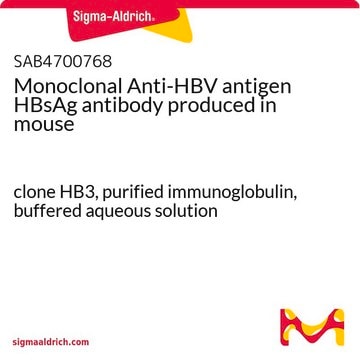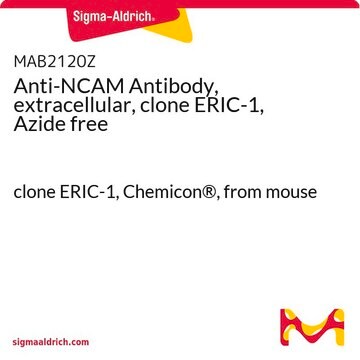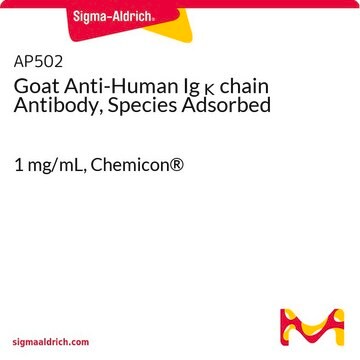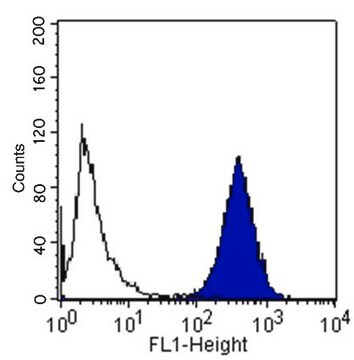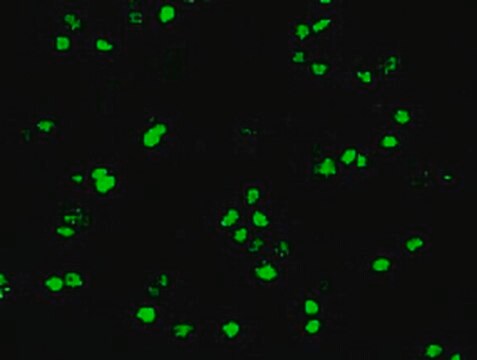MABE1177
Anti-PNKP Antibody, clone H101.2
clone H101.2, from mouse
Sinonimo/i:
Bifunctional polynucleotide phosphatase/kinase, DNA 5′-kinase/3′-phosphatase, Polynucleotide kinase-3′-phosphatase
About This Item
Prodotti consigliati
Origine biologica
mouse
Forma dell’anticorpo
purified immunoglobulin
Tipo di anticorpo
primary antibodies
Clone
H101.2, monoclonal
Reattività contro le specie
human, bovine, monkey
tecniche
ELISA: suitable
immunoprecipitation (IP): suitable
western blot: suitable
Isotipo
IgG1κ
N° accesso NCBI
N° accesso UniProt
Condizioni di spedizione
wet ice
modifica post-traduzionali bersaglio
unmodified
Informazioni sul gene
human ... PNKP(11284)
Descrizione generale
Specificità
Immunogeno
Applicazioni
Epigenetics & Nuclear Function
Cell Cycle, DNA Replication & Repair
Western Blotting Analysis: A representative lot detected the endogenous PNKP in A549 whole cell lysates, as well as purified full-length 60 kDa recombinant human PNKP and its 14.9 kDa N-terminal (a.a. 2-140) cyanogen bromide cleavage fragment (Fanta, M., et al. (2001). Hybridoma. 20(4):237-242).
Western Blotting Analysis: A representative lot detected the endogenous PNKP in CHO cell lysates and calf thymus tissue homogenates (Fanta, M., et al. (2001). Hybridoma. 20(4):237-242).
Immunoprecipitation Analysis: A representative lot immunoprecipited PNKP from A549 cell lysates (Fanta, M., et al. (2001). Hybridoma. 20(4):237-242).
ELISA Analysis: Clone H101.2 hybridoma culture supernatant was confirmed for its immunoreactivity against His-tagged human PNKP by ELISA (Fanta, M., et al. (2001). Hybridoma. 20(4):237-242).
Qualità
Western Blotting Analysis: 8.0 µg/mL of this antibody detected PNKP in 50 µg of A549 cell lysate.
Descrizione del bersaglio
Stato fisico
Stoccaggio e stabilità
Altre note
Esclusione di responsabilità
Non trovi il prodotto giusto?
Prova il nostro Motore di ricerca dei prodotti.
Codice della classe di stoccaggio
12 - Non Combustible Liquids
Classe di pericolosità dell'acqua (WGK)
WGK 1
Punto d’infiammabilità (°F)
Not applicable
Punto d’infiammabilità (°C)
Not applicable
Certificati d'analisi (COA)
Cerca il Certificati d'analisi (COA) digitando il numero di lotto/batch corrispondente. I numeri di lotto o di batch sono stampati sull'etichetta dei prodotti dopo la parola ‘Lotto’ o ‘Batch’.
Possiedi già questo prodotto?
I documenti relativi ai prodotti acquistati recentemente sono disponibili nell’Archivio dei documenti.
Il team dei nostri ricercatori vanta grande esperienza in tutte le aree della ricerca quali Life Science, scienza dei materiali, sintesi chimica, cromatografia, discipline analitiche, ecc..
Contatta l'Assistenza Tecnica.

